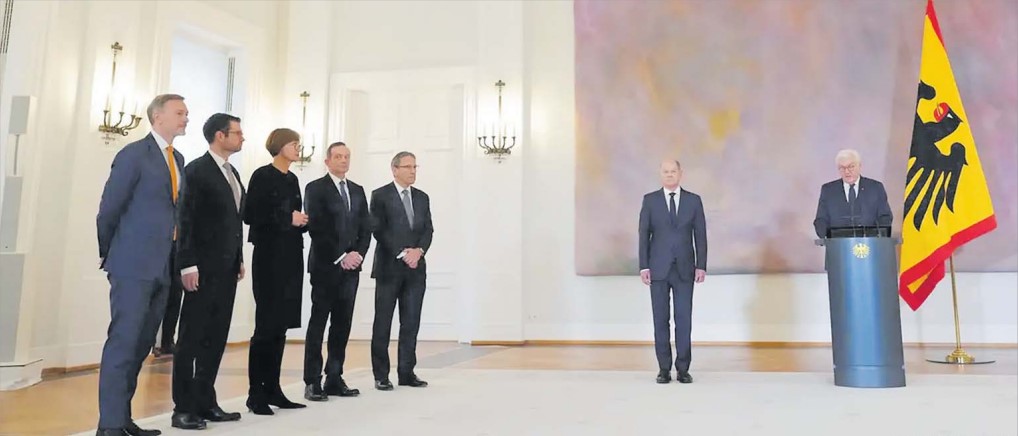Last week Germany’s head of government, the Chancellor Olaf Scholz, dismissed Finance Minister Christian Lindner, the leader of the neo-liberal Free Democratic Party (FDP). This effectively ended the fragile “traffic light” coalition that Mr Scholz led with the SPD (his Social Democratic Party), the Greens, and the FDP, the smallest coalition partner, and plunged Europe’s largest economy into a political crisis. For many Germans, this collapse was not a shock; it was more like a ticking time bomb finally going off after months of bitter disagreements. As Fiji watches these events unfold, there are striking parallels and lessons that we can draw.
GERMANY’S political structure is designed to facilitate broad representation, but it often comes with a price: the uneasy dance of coalition governments. The Bundestag, Germany’s Parliament, uses a mixed-member proportional representation system, blending direct constituency votes with proportional representation. Such a system promotes power-sharing, and single party governments with absolute majorities are rare. Electoral outcomes often require parties to forge coalitions to form government. The coalition that Mr Scholz led was born out of such necessity, cobbled together after the 2021 elections following the end of Angela Merkel’s 16-year reign as Chancellor. Her departure left a void, and Mr Scholz, leading the SPD, stepped into the breach, negotiating for weeks to form an unlikely alliance with the Greens and the FDP.
The “traffic light” coalition—so named for the colors of its constituent parties: red (SPD), green (the Greens), and yellow (FDP)—was a bold experiment in political co-operation. But from the start, many doubted it would last. The Greens, staunch advocates for aggressive climate policies and social reforms, found themselves at odds with the fiscally conservative FDP, which championed free-market economics and strict budget discipline. In between stood Mr Scholz’s SPD, trying to hold it all together with promises of pragmatic governance and progressive reform. The tensions came to a head over budget policy in recent months, with Mr Scholz demanding increased government spending to tackle Germany’s economic challenges, including the energy crisis exacerbated by Russia’s invasion of Ukraine. Mr Lindner and the FDP, on the other hand, were steadfast on holding firm to FDP’s core belief in fiscal restraint and adamantly opposed to loosening Germany’s “debt brake” – a constitutional rule that limits public borrowing. The resulting stalemate over budget policy ultimately led Mr Scholz to dismiss Mr Lindner, citing a breakdown of trust. Mr Lindner accused Mr Scholz of undermining fiscal discipline, a key tenet of the FDP’s platform. In a country that prides itself on political stability, the collapse of such a coalition is seismic.
For Fiji, the similarities are uncanny. The coalition that came to power in Fiji in late 2022 – comprising the People’s Alliance Party (PAP), the National Federation Party (NFP), and the Social Democratic Liberal Party (SODELPA) – was born out of necessity, much like Germany’s traffic light coalition. The three-party alliance emerged as the alternative to Bainimarama’s FijiFirst party, which had no political allies and ruled with an iron grip vvfor 16 years. Bainimarama, akin to Merkel, was a figure of continuity and control, though with markedly different styles and legacies. His defeat was a watershed moment, signaling a departure from the politics of unilateral dominance – but was it truly?
The Fijian coalition was, however, problematic from the start forged around a shared goal of removing a common enemy. Prime Minister Sitiveni Rabuka’s PAP campaigned on a platform of multiracialism, only to later shift rightward and lean toward iTaukei ethnonationalist rhetoric and policies once in power. This was a jarring shift for many, given Mr Rabuka’s past leadership in Fiji’s coups and his polarising role in ethnic politics. SODELPA, historically a champion of indigenous rights, found itself in an uneasy alliance with the PAP, while the NFP – a long-standing advocate of equal citizenry, multiracialism, and common voter rolls – became the coalition’s ideological outlier. The electoral math of Fiji’s proportional representation system and voting behaviour along ethnic lines, saw PAP and SODELPA secure their seats largely on the back of iTaukei votes, while the NFP’s voter base was predominantly Indo-Fijian, making up roughly 80 per cent of its 41,830 votes.
Now, at the midpoint of its four-year term, the PAP/NFP/SODELPA coalition has also faced a turbulent journey and whilst SODELPA has on several occasions aired its grievances about the government’s direction and modus operandi, often doing so publicly, the NFP has remained conspicuously silent, even when government policies and ideologies have contradicted its historical principles. This compromise by the NFP has kept the coalition intact, but come at a huge cost to the party, as it risks alienating and eroding its voter base. In this dynamic, SODELPA has been similar to Germany’s FDP, often seen to be wielding disproportionate influence and holding strategic ministerial portfolios despite being the smallest coalition partner.
Fiji’s coalition dynamics took a new turn in July 2024, when the main opposition party, FijiFirst, was deregistered. This led to nine former FijiFirst MPs declaring their support for Mr Rabuka, effectively consolidating his power and reducing the leverage of the coalition partners. With this new support base, Rabuka’s position is now secure, making a vote of no confidence unlikely to succeed. This development bears a warning for Fiji: while Mr Rabuka may feel emboldened by his strengthened position, sidelining NFP and SODELPA in favour of independent MPs would be a risky move.
Such a shift would erode trust among coalition partners and could destabilise the government in the long term. The nine independent MPs are free agents, with the autonomy to vote as they see fit, including on critical issues like the budget. This means that Mr Rabuka would need to ensure the support of at least seven of these MPs whenever crucial legislation is at stake, creating an unpredictable and potentially volatile dynamic.
The collapse of Germany’s coalition government underscores the importance of maintaining open dialogue, mutual respect, and a genuine commitment to partnership, on the part of all coalition partners. Coalitions are by nature precarious. They require compromise, patience, and a shared vision that transcends individual party interests. The German case has several striking parallels for Fiji, and provides key lessons for the functioning of a three-party coalition – which is definitely way more challenging than managing a two party coalition government. Consolidating power at other’s expense, without genuine partnership, can lead to instability – and for a developing state like Fiji – come at a huge economic cost which renders every Fijian worse off.
- NILESH LAL is the Executive Director of Dialogue Fiji. The views expressed herein are his and not of this newspaper.













